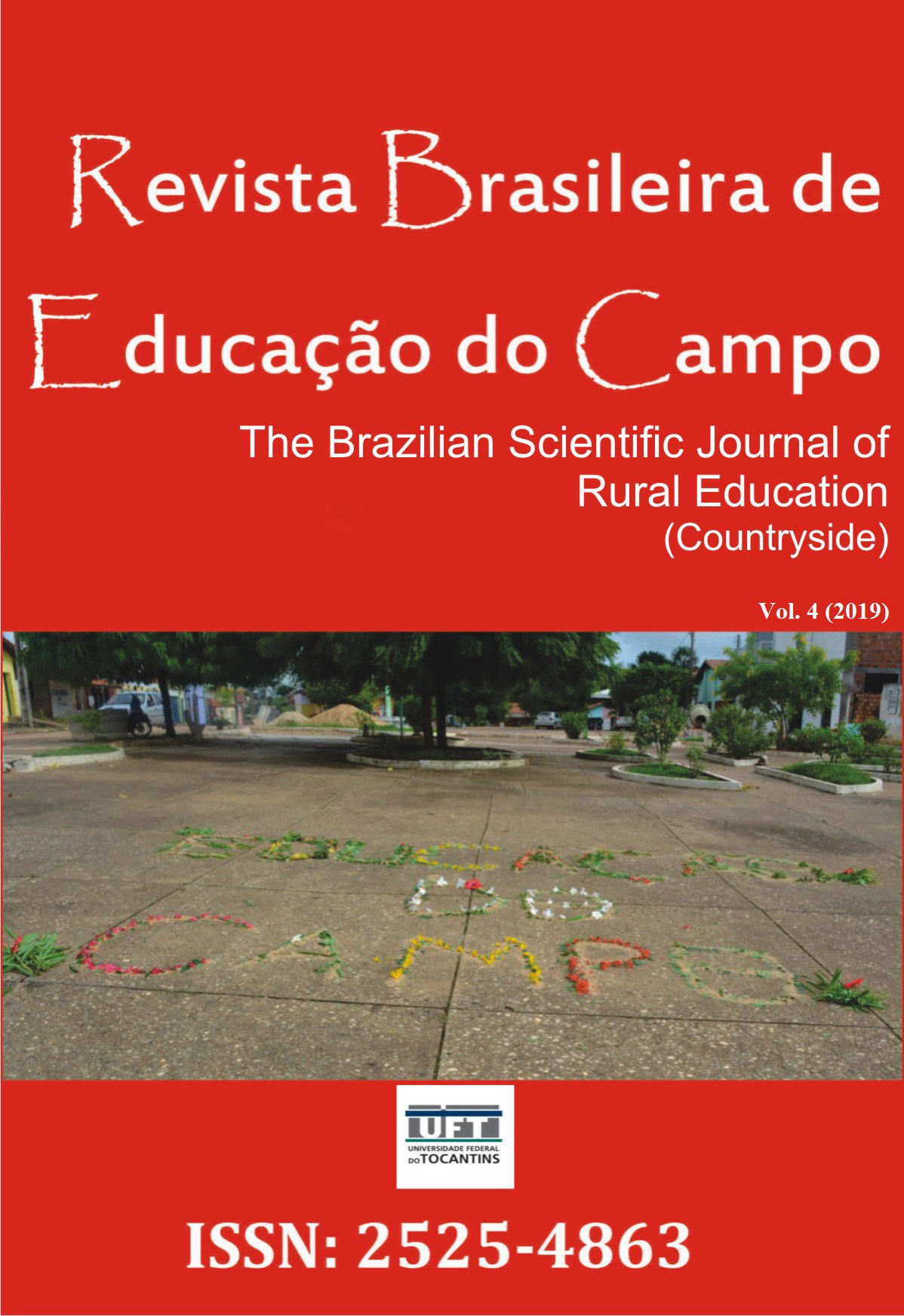Environmental interfaces in the countryside education licensee: an analysis of the pedagogical proposal
DOI:
https://doi.org/10.20873/uft.rbec.v4e5869Schlagworte:
Environment, Countryside Education, Interdisciplinary JointsAbstract
ABSTRACT. Undergraduate Courses in Countryside Education were created in several universities with the formative purpose of meeting the demand of Brazilian diversity and the demands of social organizations. In this sense, there is a need to investigate how the Political Pedagogical Project (PPP) of the Graduation in Countryside Education of the Federal University of Roraima deals with questions related to nature and how it establishes interfaces with the environment. For the accomplishment of the study, the curricular document of the mentioned course was taken as base, giving priority to the content analysis (Bardin, 2011). The analysis was based on the concept of curriculum from the perspective of Apple and Beane (2001), Moreira (2007), Freire and Shor (2008), among others. It was found that the document establishes interfaces between knowledge, such as between the environment and environmental education. However it was evidenced that there is not much clarity in the methodological procedures of the implementation of the project and in the accomplishment of the activities in the Community Time.
Downloads
Literaturhinweise
Apple, M. W.,& Beane, J. A. (2001). O argumento por escolas democráticas. In ____. (Orgs). Escolas Democráticas (pp. 200-210). 2. ed. São Paulo: Cortez.
Bardin, L. (2011). Análise de conteúdo. São Paulo: Edições 70.
Caldart, R. S. (2004). Por uma educação do campo: traços de uma identidade em construção. In Arroyo, M. G., Caldart, R. S., & Molina, M. C. (Orgs.). Por uma Educação do Campo (pp. 45-50). Petrópolis: Vozes.
Caldart, R. S. (2012). Intencionalidades na formação de Educadores do Campo: reflexões desde a experiência do curso. In Antunes-Rocha, M. I., Martins, M. F. A., & Martins, A. A. (Orgs.). Territórios Educativos na Educação do Campo: Escola, Comunidade e Movimentos Sociais (pp. 119-142). 2. ed. Belo Horizonte: Ed. Gutenberg.
Candau, V. M. F. (1982). A Formação de educadores: uma perspectiva multidimensional. Em Aberto, 1(8), 18-23.
Caporal, F. R., & Costabeber, J. A. (2000). Agroecologia e desenvolvimento rural sustentável: perspectivas para uma nova Extensão Rural. Agroecologia e Desenvolvimento Rural Sustentável, 1(1),16-37.
Delors, J. (1998). Educação – um tesouro a descobrir. Relatório para a UNESCO da Comissão Internacional sobre Educação para o século XXI. SP: Cortez, Brasília: MEC/UNESCO.
Edital de Convocação nº 09. (2009, 29 de abril) Programa de Apoio à Formação Superior em Licenciatura em Educação do Campo – PROCAMPO. Brasília: SECAD/MEC. Recuperado de: https://goo.gl/R2pZ9g.
Freire, P. (2003). Pedagogia da autonomia: saberes necessários à prática educativa. 28. ed. São Paulo: Paz e Terra, 148 p.
Freire, P. (1981). Pedagogia do Oprimido. 9 ed., Rio de Janeiro. Editora Paz e Terra, p.79.
Freire, P. (2010). Pedagogia do oprimido. 49. ed. Rio de Janeiro: Paz e Terra.
Freire, P., & Shor, I. (2008). Medo e ousadia: o cotidiano do professor. 12. ed. Rio de Janeiro: Paz e Terra.
Gimeno Sacristán, J. (2000). O currículo: uma reflexão sobre a prática. 3. ed. Porto Alegre: Artmed.
Molina, M. C. (2015). Expansão das licenciaturas em Educação do Campo: desafios e potencialidades. Educar em Revista, 55, 145-166. Doi: http://dx.doi.org/10.1590/0104-4060.39849
Moreira, A. F. B. (2007). Indagações sobre currículo: currículo, conhecimento e cultura. Brasília: MEC/SEB.
Morin, E. (2002). Os sete saberes necessários à educação do futuro. 5 ed. São Paulo: Cortez; Brasília: UNESCO.
Morin, E. (s/d). O Método II, a vida da vida. 2. ed. Portugal: Publicações Europa América Ltda.
Pombo, O. (2008). Problemas e Perspectivas da Interdisciplinaridade. Revista de Educação e Letras, 10(1), 9-40.
Popkewitz, T. S. (2001). Lutando em defesa da alma – a política do ensino e a construção e a construção do professor. Porto Alegre: ARTMED.
Resolução CNE/CEB nº 01/2002. Institui as Diretrizes Curriculares Nacionais para a Formação de Professores da Educação Básica, em nível superior, curso de licenciatura, de graduação plena. Brasília/DF.
Resolução/CD/FNDE nº. 06 (2009, 17 de março). Estabelece as orientações e diretrizes para a operacionalização da assistência financeira suplementar aos projetos educacionais que promovam o acesso e a permanência na universidade de estudantes de baixa renda e grupos socialmente discriminados. Brasília/DF.
Sato, M., & Santos, J. E. (2001). Tendências nas pesquisas em educação ambiental. In Reigota, M., Noal, F., & Barcelos, V. (Orgs.). (2001). Caminhos da educação ambiental (pp. 1-8). Santa Cruz do Sul: UDUNISC.
Silva, T. T. (2000). Teorias do currículo: uma introdução crítica. Porto: Porto Editora.
Unesco. (2002). Educação, diversidade criadora e cultura de paz. In II Congresso Nacional sobre Investimento Privado. Fortaleza.
Universidade Federal de Roraima. (2010). Projeto Pedagógico do Curso de Licenciatura em Educação do Campo, Boa Vista-RR. Recuperado em: https://bit.ly/2T3vCII.
Veröffentlicht
Zitationsvorschlag
Ausgabe
Rubrik
Lizenz
Creative Commons Attribution License
Creative Commons Attribution License
Proposal for Copyright Notice Creative Commons
1. Policy Proposal to Open Access Journals
Authors who publish with this journal agree to the following terms:
A. Authors retain copyright and grant the journal right of first publication with the work simultaneously licensed under the Creative Commons Attribution License that allows sharing the work with recognition of its initial publication in this journal.
B. Authors are able to take on additional contracts separately, non-exclusive distribution of the version of the paper published in this journal (ex .: publish in institutional repository or as a book), with an acknowledgment of its initial publication in this journal.
C. Authors are permitted and encouraged to post their work online (eg .: in institutional repositories or on their website) at any point before or during the editorial process, as it can lead to productive exchanges, as well as increase the impact and the citation of published work (See the Effect of Open Access).














